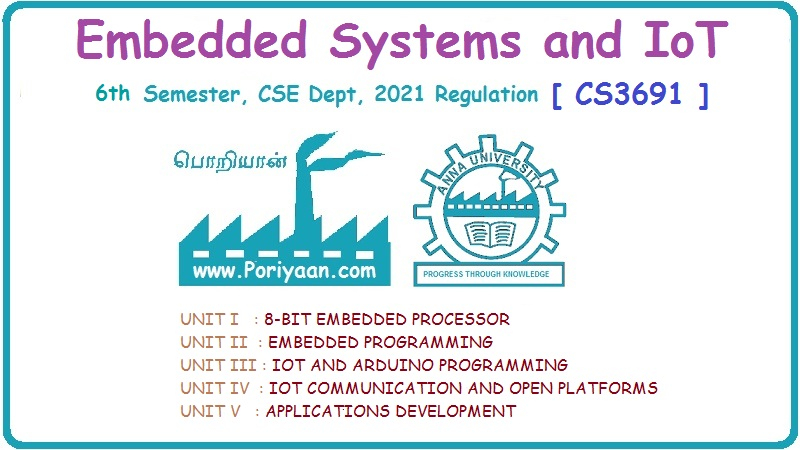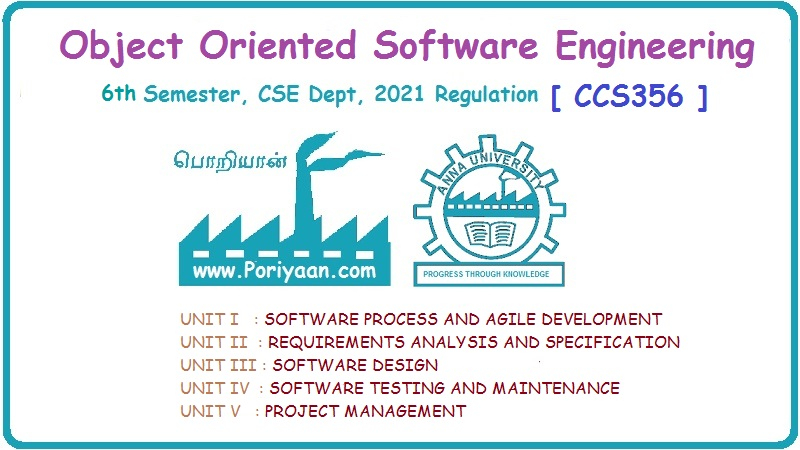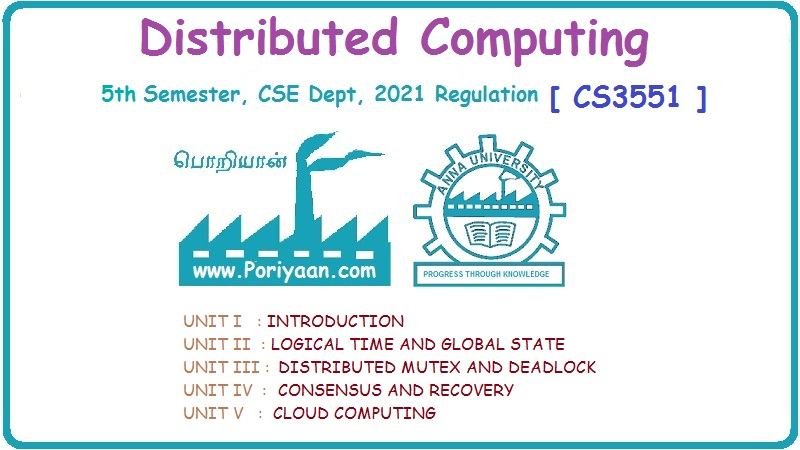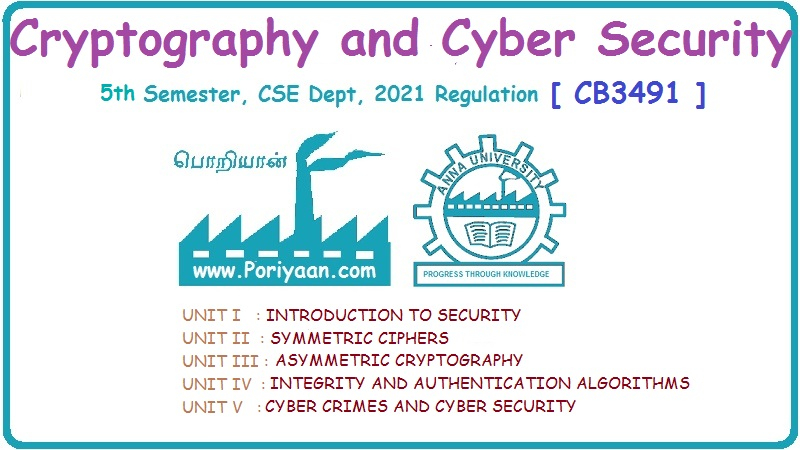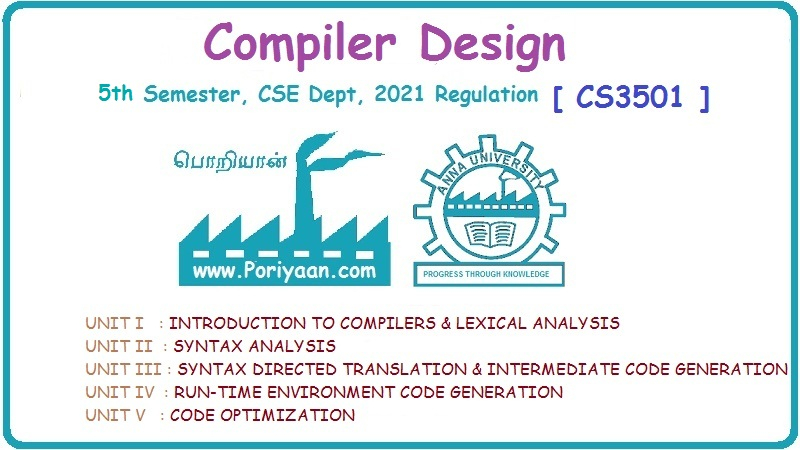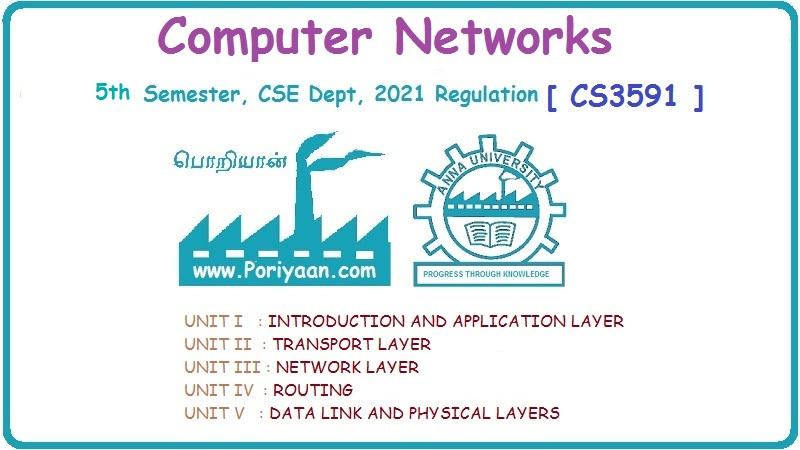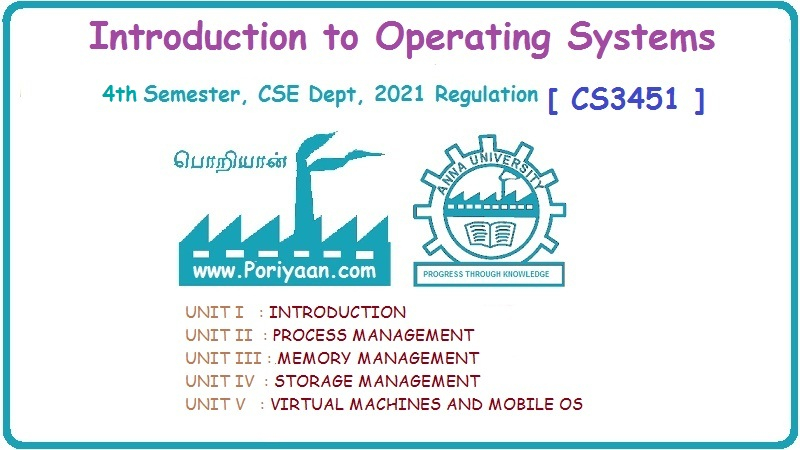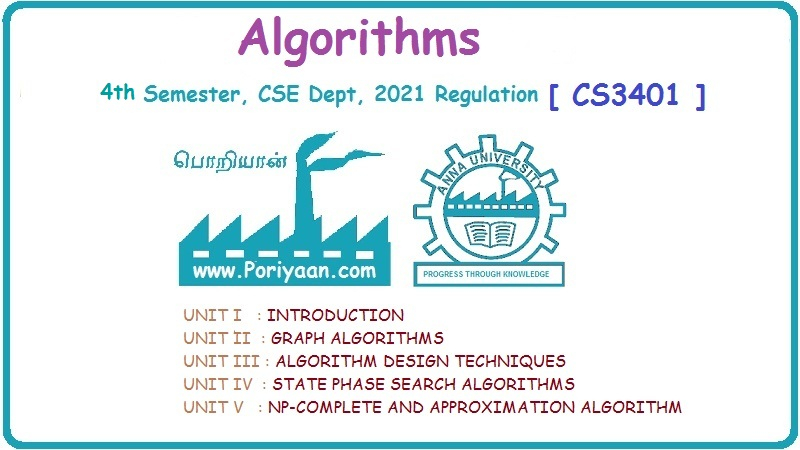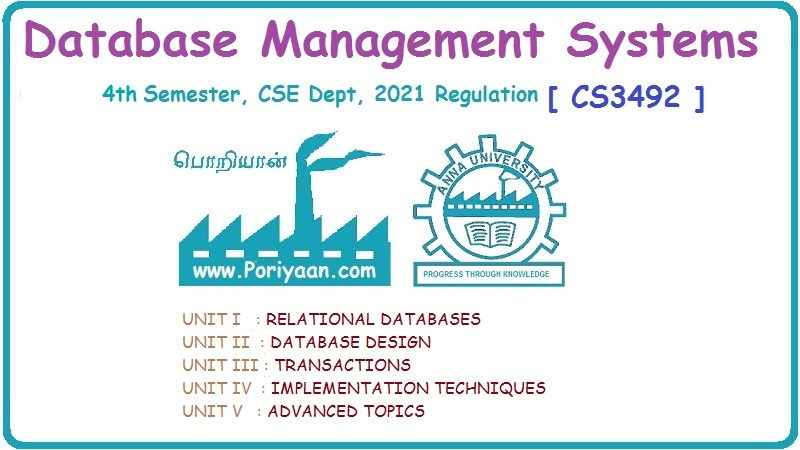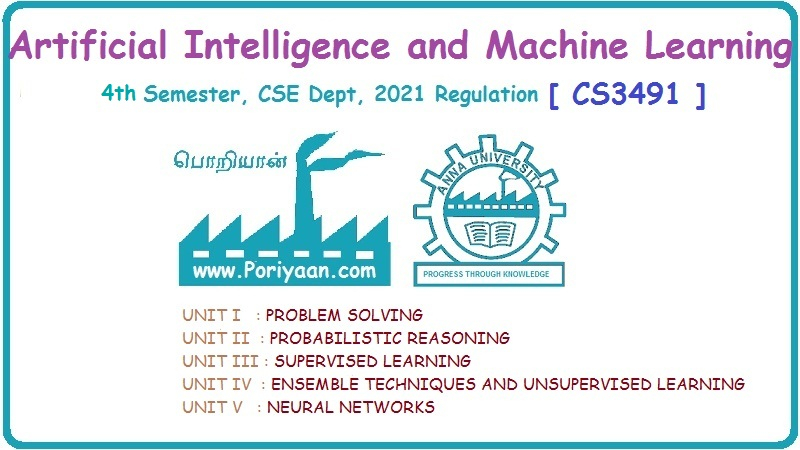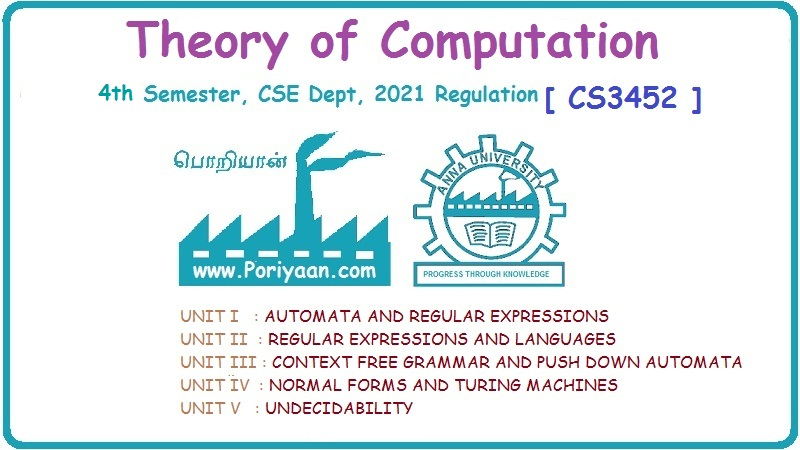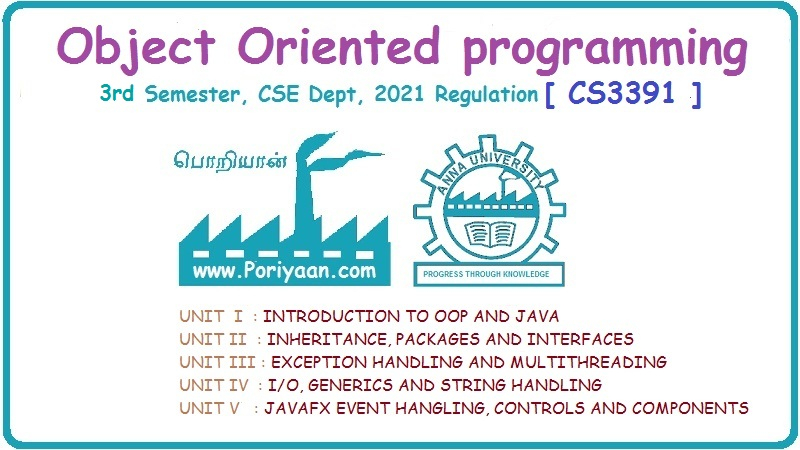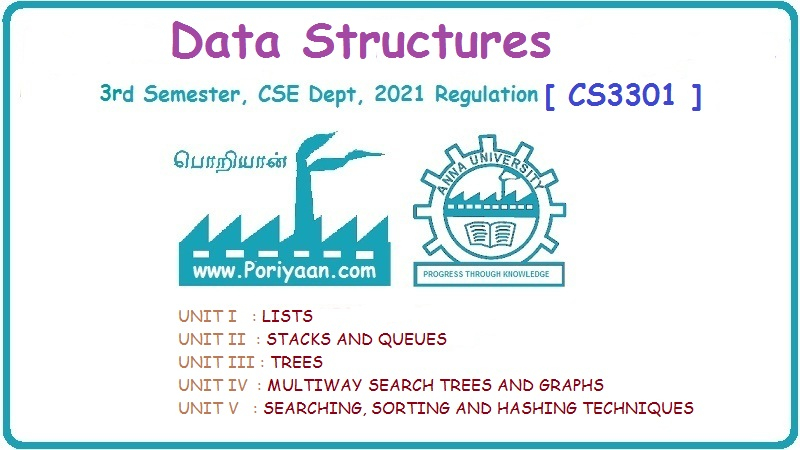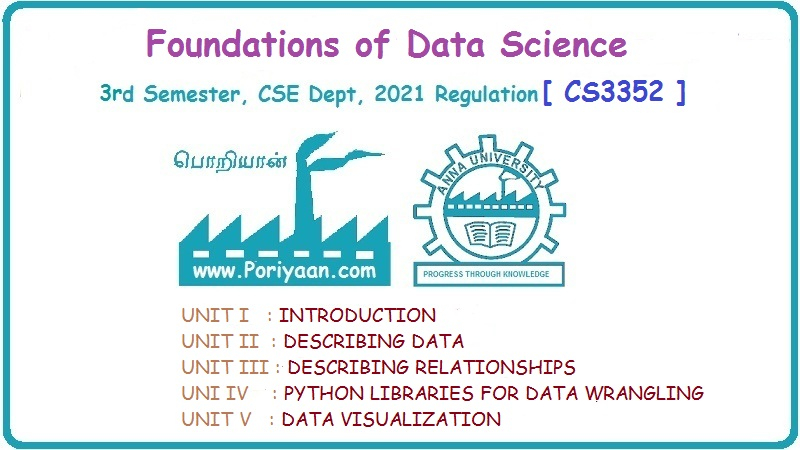Compiler Design
CS3501 5th Semester CSE Dept | 2021 Regulation

2021 regulation - 3rd year, 5th semester paper for CSE Department (Computer Science Engineering Department). Subject Code: CS3501, Subject Name: Compiler Design, Batch: 2021, 2022, 2023, 2024. Institute: Anna University Affiliated Engineering College, TamilNadu. This page has Compiler Design study material, notes, semester question paper pdf download, important questions, lecture notes.
PDF Download Links
Compiler Design
Notes and Question Answer of Unit I: Introduction to Compilers & Lexical Analysis will Uploaded shortly...
Notes and Question Answer of Unit II: syntax Analysis will Uploaded shortly...
Notes and Question Answer of Unit III: Syntax Directed Translation & Intermediate Code Generation will Uploaded shortly...
Notes and Question Answer of Unit IV: Run-Time Environment and Code Generation will Uploaded shortly...
Notes and Question Answer of Unit V: Code Optimization will Uploaded shortly...
PDF Download Links
Compiler Design
Unit I: Introduction to Compilers & Lexical Analysis
Notes and Question Answer of Unit I: Introduction to Compilers & Lexical Analysis will Uploaded shortly...
Unit II: syntax Analysis
Notes and Question Answer of Unit II: syntax Analysis will Uploaded shortly...
Unit III: Syntax Directed Translation & Intermediate Code Generation
Notes and Question Answer of Unit III: Syntax Directed Translation & Intermediate Code Generation will Uploaded shortly...
Unit IV: Run-Time Environment and Code Generation
Notes and Question Answer of Unit IV: Run-Time Environment and Code Generation will Uploaded shortly...
Unit V: Code Optimization
Notes and Question Answer of Unit V: Code Optimization will Uploaded shortly...
PDF Download Links

CS3501
COMPILER
DESIGN
COURSE
OBJECTIVES:
• To learn the various phases of compiler.
• To learn the various parsing techniques.
• To understand intermediate code
generation and run-time environment.
• To learn to implement the front-end of
the compiler.
• To learn to implement code generator.
• To learn to implement code optimization.
UNIT
I INTRODUCTION TO COMPILERS &
LEXICAL ANALYSIS
Introduction-
Translators- Compilation and Interpretation- Language processors -The Phases of
Compiler – Lexical Analysis – Role of Lexical Analyzer – Input Buffering –
Specification of Tokens – Recognition
of Tokens – Finite Automata – Regular Expressions to Automata NFA, DFA –
Minimizing DFA - Language for Specifying Lexical Analyzers – Lex tool.
UNIT
II SYNTAX ANALYSIS
Role
of Parser – Grammars – Context-free grammars – Writing a grammar Top Down
Parsing - General Strategies - Recursive Descent Parser Predictive Parser-LL(1)
- Parser-Shift Reduce Parser-LR Parser- LR (0)Item Construction of SLR Parsing
Table - Introduction to LALR Parser - Error Handling and Recovery in Syntax
Analyzer-YACC tool - Design of a syntax Analyzer for a Sample Language
UNIT
III SYNTAX DIRECTED TRANSLATION &
INTERMEDIATE CODE GENERATION
Syntax
directed Definitions-Construction of Syntax Tree-Bottom-up Evaluation of
S-Attribute Definitions- Design of predictive translator - Type
Systems-Specification of a simple type Checker- Equivalence of Type
Expressions-Type Conversions. Intermediate Languages: Syntax Tree, Three
Address Code, Types and Declarations, Translation of Expressions, Type
Checking, Back patching.
UNIT
IV RUN-TIME ENVIRONMENT AND CODE
GENERATION
Runtime
Environments – source language issues – Storage organization – Storage
Allocation Strategies: Static, Stack and Heap allocation - Parameter
Passing-Symbol Tables - Dynamic Storage Allocation - Issues in the Design of a
code generator – Basic Blocks and Flow graphs - Design of a simple Code
Generator - Optimal Code Generation for Expressions– Dynamic Programming Code
Generation.
UNIT
V CODE OPTIMIZATION
Principal
Sources of Optimization – Peep-hole optimization - DAG- Optimization of Basic
Blocks - Global Data Flow Analysis - Efficient Data Flow Algorithm – Recent
trends in Compiler Design.
LIST
OF EXPERIMENTS:
1. Using the LEX tool, Develop a lexical
analyzer to recognize a few patterns in C. (Ex. identifiers, constants,
comments, operators etc.). Create a symbol table, while recognizing
identifiers.
2. Implement a Lexical Analyzer using LEX
Tool
3. Generate YACC specification for a few
syntactic categories.
a. Program to recognize a valid arithmetic
expression that uses operator +, -, * and /.
b. Program to recognize a valid variable
which starts with a letter followed by any number of letters or digits.
c. Program to recognize a valid control
structures syntax of C language (For loop, while loop, if-else, if-else-if,
switch-case, etc.).
d. Implementation of calculator using LEX
and YACC
4. Generate three address code for a simple
program using LEX and YACC.
5. Implement type checking using Lex and
Yacc.
6. Implement simple code optimization
techniques (Constant folding, Strength reduction and Algebraic transformation)
7. Implement back-end of the compiler for
which the three address code is given as input and the 8086 assembly language
code is produced as output.
COURSE
OUTCOMES:
On
Completion of the course, the students should be able to:
CO1:Understand
the techniques in different phases of a compiler.
CO2:Design
a lexical analyser for a sample language and learn to use the LEX tool.
CO3:Apply
different parsing algorithms to develop a parser and learn to use YACC tool
CO4:Understand
semantics rules (SDT), intermediate code generation and run-time environment.
CO5:Implement
code generation and apply code optimization techniques.
TEXT
BOOK:
1.
Alfred V. Aho, Monica S. Lam, Ravi Sethi, Jeffrey D. Ullman, “Compilers:
Principles, Techniques and Tools”, Second Edition, Pearson Education, 2009.
REFERENCES
1. Randy Allen, Ken Kennedy, Optimizing
Compilers for Modern Architectures: A Dependence based Approach, Morgan
Kaufmann Publishers, 2002.
2. Steven S. Muchnick, Advanced Compiler
Design and Implementation‖, Morgan Kaufmann Publishers - Elsevier Science, India,
Indian Reprint 2003.
3. Keith D Cooper and Linda Torczon,
Engineering a Compiler‖, Morgan Kaufmann Publishers Elsevier Science, 2004.
4. V. Raghavan, Principles of Compiler
Design‖, Tata McGraw Hill Education Publishers, 2010.
5. Allen I. Holub, Compiler Design in C‖,
Prentice-Hall Software Series, 1993.
Compiler Design: Unit I: Introduction to Compilers & Lexical Analysis,, Compiler Design: Unit II: syntax Analysis,, Compiler Design: Unit III: Syntax Directed Translation & Intermediate Code Generation,, Compiler Design: Unit IV: Run-Time Environment and Code Generation,, Compiler Design: Unit V: Code Optimization 5th Semester CSE Dept 2021 Regulation : CS3501 5th Semester CSE Dept | 2021 Regulation Compiler Design
